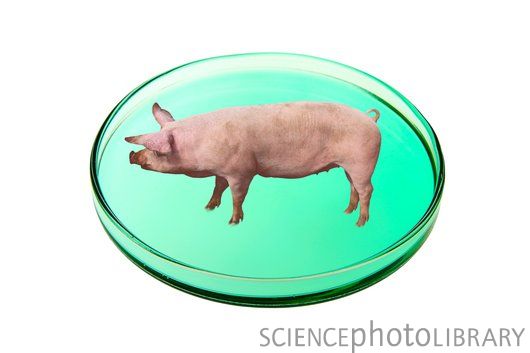据英国《每日电讯报》和《独立报》报道,人类器官短缺迫使科学家们不断探索如何使用人类基因培育转基因猪,并将这些长在猪身上的器官移植到人类身上,同时避免免疫系统排斥。现在科学家们宣称,猪-人器官移植有望在2013年实现。

转基因猪有望解决人类器官的短缺问题
英国匹兹堡大学一个研究团队在《柳叶刀》杂志上发表论文预测:“新一代转基因猪的培育,可能改善细胞和角膜异种移植的效果。我们认为,今后两到三年内就可以投入临床实验。”
动物实验显示,肺脏、心脏以及肾脏等更大器官的异种移植,可能需要更长时间才能实现,因为存在大量失血等问题。研究人员称,在给非人灵长类动物移植这些大 型猪器官的实验中,移植肺脏存活的时间最短,仅有几天,移植心脏存活的时间最长,可达6-8个月,而给人类成功移植这些器官,可能要几年后才能实现。
但是科学家认为,在关键时刻,可以将转基因猪的肝脏或心脏临时移植给病人,使病人能够存活到找到适用的人类器官,这样的移植可以在短期内实现。
相关英文论文摘要:
Clinical xenotransplantation: the next medical revolution?
The shortage of organs and cells from deceased individuals continues to restrict allotransplantation. Pigs could provide an alternative source of tissue and cells but the immunological challenges and other barriers associated with xenotransplantation need to be overcome. Transplantation of organs from genetically modified pigs into non-human primates is now not substantially limited by hyperacute, acute antibody-mediated, or cellular rejection, but other issues have become more prominent, such as development of thrombotic microangiopathy in the graft or systemic consumptive coagulopathy in the recipient. To address these problems, pigs that express one or more human thromboregulatory or anti-inflammatory genes are being developed. The results of preclinical transplantation of pig cells , islets, neuronal cells, hepatocytes, or corneas much more encouraging than they are for organ transplantation, with survival times greater than 1 year in all cases. Risk of transfer of an infectious microorganism to the recipient is small.
英文论文链接:https://www.thelancet.com/journals/lancet/article/PIIS0140-6736(11)61091-X/abstract







